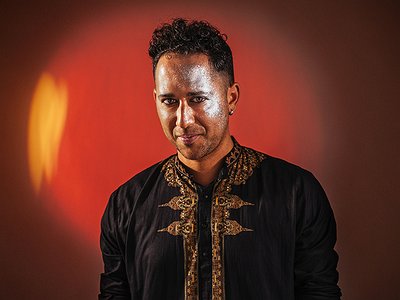Name: Baiju Bhatt
Occupation: Violinist, composer, improviser
Nationality: Indian-Swiss
Current release: Baiju Bhatt & Red Sun's People Of Tomorrow is out March 31st.
If you enjoyed this interview with Baiju Bhatt and would like to know more about his work, visit his official homepage. He is also on Instagram, and Facebook.
When did you first start getting interested in musical improvisation?
As a kid, playing around with sounds, textures, percussion, just comes naturally.
After some years of classical training on the violin, I felt I needed some freedom and starting playing other styles of music where improvisation is present (folk music from around the world, mostly) on the violin, and jazz on the piano.
It later merged into what has become my jazz practice on violin.
Which artists, approaches, albums or performances involving prominent use of improvisation captured your imagination in the beginning?
Indian music in general (Hindustani and Carnatic, as well as East/West fusion like Shakti). Klezmer, South American, African music. And later, Swing and Jazz, with prominent violinists such as Stéphane Grappelli and Jean-Luc Ponty (Live at the Chaméléon by Humair-Louiss-Ponty remains one of my absolute favorites …).
Focusing on improvisation can be an incisive transition. Aside from musical considerations, there can also be personal motivations for looking for alternatives. Was this the case for you, and if so, in which way?
Yes, it was definitely a way to integrate more freedom into my practice after the Classical studies at the Conservatory.
A way of expressing my own emotions, and being able to play according to the present moment, in a setting that allows fun, spontaneity, and interplay.
What, would you say, are the key ideas behind your approach to improvisation? Do you see yourself as part of a tradition or historic lineage?
I see myself as part of three main traditions in music playing and improvising : Jazz and 20th century popular music, traditional folk music from different parts of the world, and Western Classical violin technique.
Can you talk about a work, event or performance in your career that's particularly dear to you? Why does it feel special to you? When, why and how did you start working on it, what were some of the motivations and ideas behind it?
I’m very proud and happy about my last piece of work, Baiju Bhatt & Red Sun’s third album People Of Tomorrow. It’s the best thing I’ve ever done, and the kind of violin music I’ve always wanted to hear. It expresses my hybrid identity as a musician and as a human, a synthesis of my Eastern and Western origins.
The process behind it has been ongoing for several years.
How do you feel your sense of identity influences your collaborations? Do you feel as though you are able to express yourself more fully in solo mode or, conversely, through the interaction with other musicians? Are you “gaining” or “sacrificing” something in a collaboration?
I generally don’t really enjoy playing alone. Alone time is for practice. To me, music comes to life during the interaction with other musicians I love, and with an appreciative audience. It’s all about being together, being present in the moment, and serving music, this strange phenomenon bigger than any individual.
This piece from our new record is actually the first and only one I’ve ever recorded solo:
When you're improvising, does it actually feel like you're inventing something on the spot – or are you inventively re-arranging patterns from preparations, practise or previous performances?
Both! Of course, it’s good to be prepared, and practicing patterns, lines and tools is an essential part of it.
But also, when playing, letting go and reaching states of flow allows to explore uncharted territory and surprise even oneself.
To you, are there rules in improvisation? If so, what kind of rules are these?
To me, it’s all about listening, and serving the music that is being played.
Knowing when to lay back, comp, support, be silent, and on the other hand, knowing when to take a stand, express our individuality and seize the moment. But always by being of service to the music.
In a way, improvisations remind us of the transitory nature of life. What, do you feel, can music and improvisation express and reveal about life and death?
It seems to me that music, and especially improvised music, is a fabulous way of celebrating the transient nature of life, whether one sees this as tragic or joyful.
A way of dancing on the thin rope that connects us all, a way of living together and connecting that is both beautiful, deep, and completely absurd.




